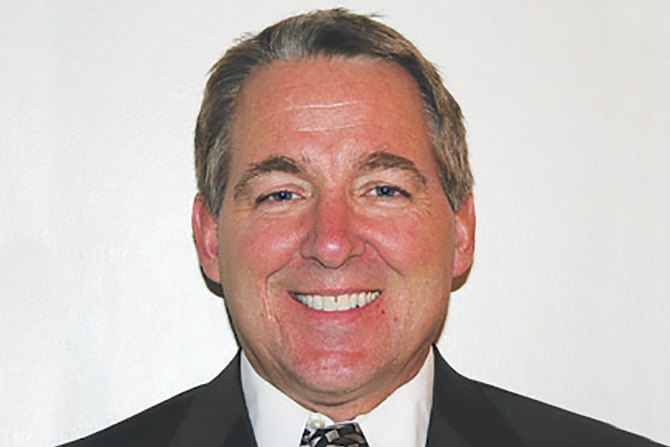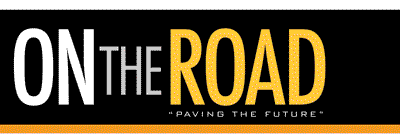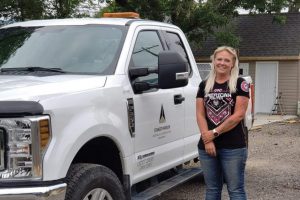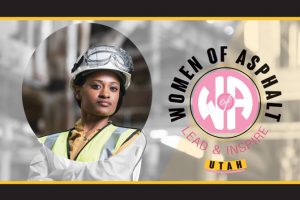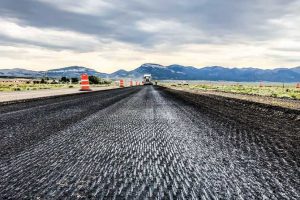How did you become involved in the asphalt industry? Was this career an evolution or a choice?
It was both, actually. One led to the other. I got into this industry while in school, and it was a natural fit for me.
I am a technical geek, I admit, and I think that has been my contribution to the industry. First through my work experience, and then through my company, CMT Group Companies.
We’re consultants in the construction industry. We design asphalt, and we design roads. We satisfy both sides of the equation in that we work with both contractors and owners, which makes for an interesting perspective.
Do you have family members in the industry?
Yes, my son, Braden, works for CMT.
Describe your educational background. What did you study?
I started college in mechanical engineering and switched to business management. But, it was my “work” education, if you will that really inspired my career.
I was working in the lab at Gibbons and Reed, and had for about three years, when we were bought by Granite Construction, Inc. I realized that I was really good at materials. Materials and I just got along, and I really liked what I was doing. I worked my way up and eventually ran the lab. I was there for 20 years.
Once Granite Construction, Inc. came into the picture though, I was exposed to a higher level of sophistication and more complex problems to solve, from design to forensic research of asphalt. I loved it. I had the opportunity to continuously learn.”
In 2000, I made a move to CMT. I negotiated ownership and eventually owned a majority of the company. The path from there to here became the educational background. It’s been a wonderful journey in a wonderful industry.
Are there any specific individuals that had a major impact on your career?
Yes, the engineering group at Granite Construction, Inc. John Epps was one of the engineers at Granite. He had a Ph.D. – I think he’s teaching at Texas A&M now. But back when I worked with him, he and Adam Hand headed up the pavement engineering group at Granite.
I learned so much about asphalt. They talked industry geek for hours – they were born teachers, and I just wanted them to pour as much into my brain as it would take. I was fascinated. Working with them was like my own personal asphalt graduate program.
What is the most rewarding part of your career?
The people. I like the people. There are such good people in this industry. I love the work. I enjoy the challenge of seeing both sides of a project – when the owners and the contractors come together. It’s really rewarding to see a good solution based on good specifications come together.
What are some of the challenges you see in this industry, and how would you fix them?
I think at one time, there was some definite dysfunction in the industry, which is really the “why” behind UAPA’s formation. Everyone was out for themselves. We needed one voice to deal with agencies in a way that made sense.
For instance, in the early 90s, the federal government changed the way the industry looked at asphalt. There was so much information and very little standardization. To some extent, this is still the case, and getting better specifications – standardized specifications – will solve a lot of this. I am a big proponent of specifications.
What do you think will be some of the dominant trends within the asphalt industry in the next 5-10 years?
I think a lot of the focus in future years will be on specifications – quite frankly. It has to be.
There’s been a lot of focus on infrastructure, and it certainly needs attention. But as we weigh in on how to spend money and on what, it will become clearer that we need to get better at what we do. We need outcomes that last – outcomes that give us the most value for the dollar, and to do the specifications that need attention. If we could settle on certain predictive tests for individual areas, that would be a great start. For instance, Alaska and Arizona need different specifications when planning projects.
As an example, I actually saw specs in a job that came right out of core research data from the 1950s. We need to do better. The infrastructure funding that is being allocated is an investment, and we need to be good stewards.
The technology is out there. Here in Utah, we’re working on an ideal CT test for cracking. As an industry, we need to work with the powers that be to get this right. I am optimistic that it will happen.
This is UAPA’s 10th year. You came on the scene early, and now you are the incoming president, so you’ve been part of UAPA’s growth and evolution. What are your thoughts about the association – where it’s been and where it’s going?
I came in about a year after UAPA’s formation. For a while I stepped back, when my time became tighter, and now I am getting back in, as my time is easing up. I think that UAPA is so important. It’s worthy of the time we all spend.
The future is bright for the industry and our association. We can and do help agencies manage infrastructure, which is the biggest nationwide initiative at the moment, and we’re 10 years into our evolution, so we’re in a great place to be the voice for the industry. It is exciting.
UAPA, of course, is a board made up of volunteers. We need to get big initiatives done with those that are involved when they are involved. I think our path of “wins” has been exceptional. Our executive director, Reed Ryan, is exceptional, and so much of our progress is due to him and his dedication.

What is the greatest importance of being a UAPA member? What makes it beneficial?
There are many benefits of membership, but I personally believe that the biggest benefit is the education – the day-to-day learning that comes from paying attention and participating. We’re an organization of education. There’s learning to be done. It’s not about large-scale battles, which take time. Not that we’re not up to the task, because we are.
What inspired you to serve as a leader within the association?
Reed talked me into it. He’s good. He’s persuasive. And since I have been around a long time, I was a natural target. But in reality, I think those of us that have been around for a long time have a responsibility to give back some thoughtful leadership into the industry. It’s how we all get better.
If you look back at your career and life, what would be three things that you have learned that you would pass onto a younger member within the industry?
You know, we all have life lessons that we learn through our professional evolution if you will. I think that they are all important and have relevance at one point or another. But I would say, first, have honor in all that you do – say what you mean, and do what you say.
Next, develop the art of perspective. People – all people – have plenty of opportunities to have misguided thoughts. But here’s the thing, the majority of people do what they think is right; they are just – at times – lacking perspective. I work with both contractors and owners, and it’s been such an interesting opportunity because these individuals both typically want the same thing: a job well done. Yet, in many cases, both parties are unable to see the others’ perspectives. So if you learn to see a problem from many facets, you can add perspective to any situation, and it’s a valuable skill.
And finally, learn your trade. Always be on the lookout for knowledge. A lot of people in this, or any industry really, don’t know what they are doing. There’s little education behind the authority. In this industry, it’s really all about the specifications of a job, yet very few people are clear on the specifications that they are asking for. Specifications are supposed to be boundaries to produce a certain outcome. It’s worth the time to learn the details of the industry that you work in. It’s important.
What effect do you think the pandemic will have on the industry going forward?
I think it’s made a significant impact in a couple of ways. First, maybe it’s just the fact that we’ve been cooped up for 15 months, but people are explosive. You hear all the time these days about people acting out on airplanes, mass shootings, and road rage. I think all industries, including ours, need to be cognizant of how we treat others and realize that people are under pressure.
We’re also missing a lot of people. Look at the workforce we don’t have. People are a huge resource; I hope they come back. I think we need to educate people that there are good jobs in construction, you can make a good living in this field.
Tell us about your family.
My wife, Nancy, and I have three children – one son and two daughters. We have two COVID puppies. With the pressures of the past 15 months, Nancy and I decided to be proactive, and we adopted two miniature poodle puppies.
What is your favorite way to spend your free time? Any unusual hobbies?
I like active outdoor stuff. Getting out in nature, snowshoeing in the winter, and hiking in the summer is a big thing for me. It clears my mind.



